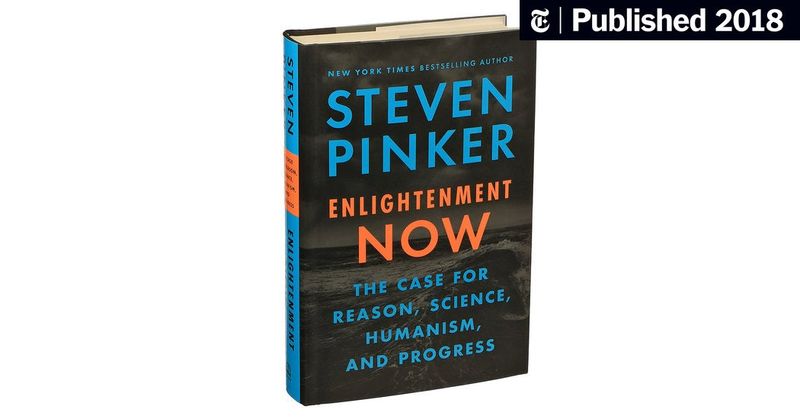A Critic's Meta Review:
Steven Pinker’s Enlightenment Now (2018) is a bold defense for the ideas that serve as the foundation for the modern world, as well as an expansive discussion of how those ideas are continuing to make the world a better place for humanity.
Although most were developed in the eighteenth century, the ideas of the Enlightenment are still as relevant today as they were when they first emerged. These ideas include reason, science, humanism, and progress. Reason is a bedrock for the others. When Enlightenment thinkers such as Immanuel Kant applied reason to the world, they began a slow but unstoppable erosion of the power of religion in society. Once applied, the scientific method allowed people to better understand human nature and recognize the similarities shared by all people. Knowing that no group of people was more deserving of special treatment than others, Enlightenment thinkers developed a new moral foundation for modern society, known as humanism. By applying a humanist sensibility to social systems, such as markets, governments, and universities, Enlightenment thinkers put humans on a path toward progress which has continued ever since.
And yet, many public figures, particularly in the United States, dismiss the reality of that progress, or its basis. On the Right, politicians including President Donald Trump have dismissed scientifically established facts, such as the science that supports theories of climate change, as a hoax. On the Left, some intellectuals following a line of thought started by the nineteenth-century German philosopher Friedrich Nietzsche continue to argue that modern advancements do more harm than good to human society. Despite arguments that Enlightenment principles are false or predicated on violence, or that civilization is in a permanent state of decline, the opposite is true: as long as humanity holds fast to the Enlightenment ideas which serve as the basis for modern civilization, the future will be better than the past.
Following the Enlightenment, several scientific principles established in the nineteenth century reinforced the humanistic worldview. The first of these principles is entropy, or the understanding that the universe is naturally disorderly and not governed by divine forces. The next principle was evolution, or the understanding that life can emerge from the natural disorder of the universe and gradually improve itself without any divine guidance. The final realization was that the universe contains information, and that this information could be transmitted, for instance through DNA, to direct the evolution of life. Understanding the idea that information can shape the direction of life is key to understanding why ideas have the power to change the outcome of life and the world.
Despite the range of challenges facing humanity in the twenty-first century—in areas as far-reaching as health, the environment, and governance—statistical evidence clearly points to one fact: since the Enlightenment, human society has been steadily getting better on virtually every front. By applying Enlightenment ideals to every facet of their existence, humans are able to understand their mistakes and successes, learn from them, and develop the regulations and technologies necessary for improvements. As long as humanity sustains this progress by applying Enlightenment principles, people have every reason to be optimistic about the future.
The news media and many of the world’s public intellectuals have perpetuated a false narrative that everything is getting worse.
It’s easy to see why people think the world is falling apart. News outlets are filled with stories about disease, war, famine, and crime. Part of the reason why these dismal stories proliferate is that many news organizations have a short-term focus and tend to sensationalize events.
Recently, some journalistic entrepreneurs have attempted to reinvigorate the kind of journalism that takes a long-term approach typically absent from the daily news. One such project is The Correspondent, an Amsterdam-based journalism site founded in 2013 by Dutch philosopher Rob Wijnberg. The Correspondent is financed through crowdfunding and membership subscriptions, not advertising, in order to relieve the commercial pressures that encourage news organizations to publish sensational stories that bait readers into clicking but ultimately provide little new information. According to its list of principles, The Correspondent is intended to be an “antidote” to the churn of the daily news, by avoiding reactionary coverage of current events and instead providing context to global trends.
The proliferation of negative news tends to skew the public’s perception of the world, leading many people to believe the world is doing badly and getting worse. But to understand how the world is changing, individuals must take a longer view than news organizations typically allow. From that perspective, the world is getting better by a variety of measures.
Many people, particularly conservative thinkers, think humanity should turn away from Enlightenment ideas, but they are still worthwhile today.
A negative perception of the modern world has led some to question the utility of Enlightenment ideas such as capitalism, science, and humanism. In Why Liberalism Failed(2018), Patrick J. Deneen, a political scientist at the University of Notre Dame, writes that liberalism, a political movement based on Enlightenment ideas, is no longer a viable system of governance for modern societies. While Enlightenment thinkers wrote that humans were individuals in a natural state of isolation, Deneen contends that in reality people were and remain bound by cultures and traditions. Liberalism’s reach over humanity has expanded, gradually replacing tradition and culture with social bureaucracies, such as representative governments managed by detached social elites who cannot adequately respond to the needs of the people they rule. Why Liberalism Failed quickly sold out of its initial print run and earned praise from both liberal and conservative reviewers, many of whom argued that Deneen offered a prescient diagnosis of the state of the world.
This animosity toward Enlightenment ideals has a long history, dating back at least as far as Nietzsche. But to suggest that Enlightenment ideals are outdated—or worse, that they were wrong to begin with—ignores the progress modern societies have made by applying them, and the progress they are continuing to make.
The world is wealthier than ever before, and even the poorest people in the world are becoming wealthier as a result.
One area where humanity is clearly making progress is in the generation of wealth. Today, people on the very bottom of the economic ladder have more money than people on the bottom did a few generations ago. While some academics point to countries where inequality is high and attribute that condition to a number of other problems, such as crime and poor health, they are wrong to presume a causal link between inequality and other social ills. Moreover, inequality has a positive benefit: it gives poor people a reason to develop personal aspirations. One study found that people tend to be happier in less equal countries. People will always gripe when others have more money than they do, and politicians may exploit those anxieties. But observers shouldn’t take these complaints as proof that humanity is getting worse.
In a 2015 working paper, Tomáš Hellebrandt and Paolo Mauro, then fellows at the Peterson Institute for International Economics in Washington, DC, outlined some optimistic projections for the future of global wealth. Global income inequality, they wrote, started falling rapidly around the year 2000; they projected that the downward trend will probably continue for the next 20 years, based on a consensus of economic and population growth projections among economists. A rise in global economic growth does not necessitate a rise in global income inequality, provided that income inequality does not rise at unprecedented rates at the national level. The researchers projected that the number of people worldwide making between $3,252 and $8,874 (in 2013 dollars) will increase by around one billion during this time. India and sub-Saharan Africa—currently two of the most poverty-stricken regions of the world—will be responsible for a significant population of those people who ascend to this income bracket. The result will be a massive increase in the number of consumers worldwide, leading to a surge in the amount of money circulating in local and regional economies in formerly impoverished areas.
Generally speaking, humanity is becoming more wealthy and well-off. Dwelling too much on inequality distracts people from the wider trend toward prosperity.
Environmental crises—including climate change—are serious problems, but they are problems that humanity can solve.
Focusing so much attention on contemporary environmental problems ignores an important fact: many of these problems are less dire than they were decades ago. Pollution is falling, the hole in the ozone layer is closing, species extinction has slowed, and many of the world’s environmental crisis areas are actually stabilizing.
One effort that was launched through the United Nations in 2005 was the Reducing Emissions from Deforestation and Forest Degradation in Developing Countries, or REDD program. REDD begins with the assumption that deforestation stems from economic causes, such as when farmers and loggers clear forests to support themselves. In response, REDD facilitates a sort of financial market for wealthy countries to exchange money for the protection of tropical forests in developing countries.
With technical support from REDD staff, developing countries draft national plans to generate economic activity in or near forest areas, so people won’t have to clear forests to support themselves. These countries then use the money REDD collects to finance those projects. The initiative has shown some substantial success. In a 2017 review of REDD projects throughout Mexico and Central America, researchers found that none of the projects led to an increase in deforestation.
Successful, science-based interventions are part of the reason why environmental degradation is happening at a much slower rate than it was decades ago. These successes show that the earth’s environment is quite resilient, and that modern, industrial society can co-exist with it. These facts must be taken into account when developing any program of environmental protection.
The world is becoming less violent.
Since the end of the Cold War, there have been fewer wars than at almost any time in human history, and the death and destruction inflicted on people during recent wars is less substantial overall. Violent crime has likewise lessened worldwide. Even road accidents are fewer now than they were 30 years ago. For all these reasons, people are less likely to die a violent death than ever before.
In the hands of a competent government, science can be useful for reducing violent incidents. In the early 1990s in the city of Cali, Colombia, for instance, Mayor Rodrigo Guerrero Velasco, who had earned a PhD in epidemiology, applied his training in statistics and public health to the city’s rampant homicide problem. Many Cali residents were skeptical of Velasco’s approach; they believed Colombians had an innate propensity towards violence. But Velasco and his staff persisted. By tracking murders and identifying patterns, the team found that young, unemployed men were disproportionately committing murder in Cali. Moreover, these men typically used a gun and acted on weekends, while they were drunk. Citing the data, Velasco successfully pressed for a ban on carrying weapons on days when people were more likely to be drinking, such as New Year’s Eve and the Friday when employers usually dispensed paychecks. Within three years, homicides fell from 124 per 100,000 to 86 per 100,000. In an article for Scientific American, Velasco attributed improved statistics to his scientific methods.
The crises that many pessimistic pundits consider to be existential threats to humanity are often exaggerated and can be managed.
For as long as civilization has existed, some people have insisted that it is doomed to end in the near future. If industrial society doesn’t collapse on itself and destroy humanity, pessimists insist, a new crop of emergent threats will destroy human civilization. The latest list of threats includes artificial intelligence, pandemics, and deadly asteroids. But these threats can be managed effectively the same way humanity has faced challenges in the past: with science and technology, and by facing problems head-on with reason instead of panic.
One supposedly existential threat that kept some people up at night until recently was “peak oil.” The term was coined by M. King Hubbert, a geologist, in 1956. Hubbert defined the peak as the moment humanity extracted half of all the oil reserves in the world, after which the amount of available oil would be in a permanent state of decline. Hubbert lived at a time when combustion engines were rapidly spreading around the world, and oil companies were rushing to keep up with demand by exploiting every conventional resource they could find. With a limited number of technologies available to find and exploit oil reserves, the prospect that demand would one day eclipse supply was realistic. Over the next several decades, however, oil companies, driven as much by competition with each other as they were by the need to keep the oil flowing, developed new technologies to exploit more difficult sources of oil. Since then, technologies including offshore drilling, deepwater drilling, tar sands mining, and fracking have helped to expand what was once thought to be a small and diminishing global oil supply into a massive reserve. Fears of “peak oil” have essentially disappeared. Likewise, dystopian fears about climate change will vanish if civilization applies the scientific method to solving the problem.
The world is becoming both more democratic and more equal. Both are signs of human progress.
Democratic societies are not just more moral than autocracies; they are wealthier, more stable, and serve their citizens more effectively. More democracy is better for everyone. In their book Why Nations Fail (2012), economists Daron Acemoglu and James A. Robinson argue that wealthy nations throughout history have been democracies, because democratic political institutions are better at creating incentives for individuals to create wealth than their counterparts in authoritarian countries. Bill Gates, for instance, may have had an innate talent for writing software and building a company, but since he grew up in the United States and not North Korea, he benefited from a school system which could translate those talents into useful skills and from labor markets which allowed him to hire the people he needed to build it with ease. Moreover, because political power in the United States is more evenly distributed than it is in many developing countries, Gates could continue to build his company freely. He did not have to fear that the government would attempt to intervene unexpectedly, take the company over, rob its wealth, or force it into a direction Gates himself would not want.
In fact, the world is becoming more democratic. There are fewer authoritarian regimes in the world today than there were a few decades ago, and even those remaining authoritarian states have become more flexible, introducing some democratic institutions and thus giving their people more freedom. As the world has become more democratic, it has become more equal. Women, minorities, and gay people enjoy more rights in more countries than ever before.
The institutions built on Enlightenment ideas are what ensure humanity’s progress.
The gains humanity has made over the last several decades stem directly from Enlightenment ideas such as democracy, capitalism, and science, as well as from the institutions that have been built on those ideas, such as representative governments, open markets, and research universities. These institutions are fundamental to making society work for everyone’s betterment, and they are what guarantee continual progress.
In the United States, numerous studies have indicated that public universities have had a direct and positive impact on local and regional economies. In recent years, a number of universities around the country have developed incubators to help students and other members of the campus community launch new businesses. TechTown, an incubator at Wayne State University in Detroit, for instance, raised more than $100 million for affiliated start-ups between 2007 and 2014. These investments had a direct impact on local employment, accounting for nearly 1,200 new jobs. The Centennial Campus, part of the North Carolina State University system, is another example of a university integrating its function as a research center with the wider economy. As of 2016, the campus housed dozens of organizations and has assisted in launching more than 100 start-ups, which, in turn, have launched more than 400 new products.
Science is fundamentally a force for progress.
Science has provided the means to develop new technologies to thwart many of the problems humanity has faced. Smallpox, for instance, inflicted harm on millions of people. Today, because of science and human intervention, it is completely gone. As humanity continues to face new problems, science will help people face them as well. In recent years, conservative politicians have cast doubt on the usefulness or morality of some scientific research. But while some people have inflicted cruelty on others in the name of science, those bad chapters in human history do not change the fact that the benefits of science have been and continue to be overwhelmingly positive.
The conservative push to undermine scientific institutions only became worse under President Donald Trump, whose candidate platform promised to cut government funding for scientific research. Trump has repeatedly claimed that climate change was a hoax. The threats were so great that in April 2017, scientists came out together in cities across the United States for the March for Science to show support for the field and challenge proposed government funding cuts. Speaking at Harvard Medical School, George Daley, the school’s dean of faculty, gave a spirited address on the importance of scientific research to better the human condition. Science, he said, was a way to parse “evidence from anecdote,” giving all people—including professional scientists, farmers, and politicians—a way to find the truth and shape outcomes. At the time, the US Congress was considering substantial cuts to the National Institutes for Health (NIH), the largest government funder of biomedical research in the world. If the cuts were passed, Daley said, they would “destabilize the economy and essentially eliminate a generation of young scientists.” Congress eventually chose not to cut the NIH budget, but to increase it.






